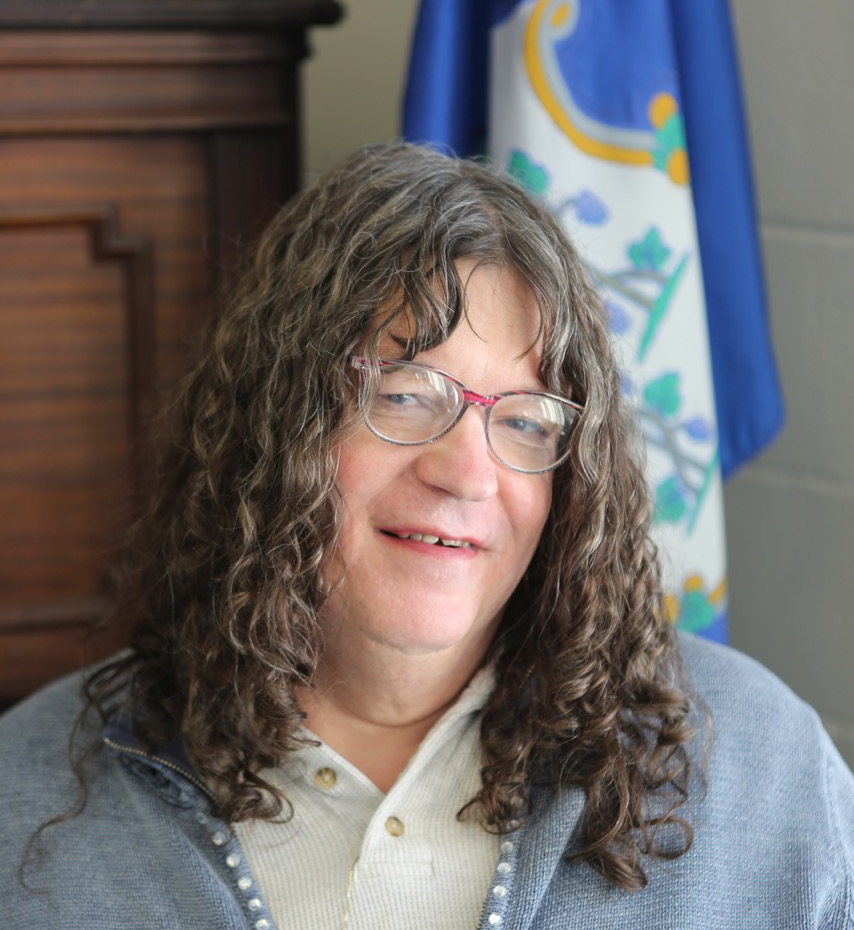When it’s official, everything.
By Jane Latus
Shakespeare only asked the question because he already knew the answer: a rose by any other name can stink.
“It might as well have been a Willy Wonka golden ticket!” Karleigh Webb says of the new driver’s license she (literally) skipped out of the DMV with last July. From then on, she had no more explaining to do. She is Karleigh Emmelene Chardonnay Webb, and she is a woman.
Most cisgender people think of ID documents only as a practical necessity. But for trans, intersex and gender non-conforming people they’re even more so, to the point of existential importance.
“As a black trans woman, every time I walk out the door, my head is on swivel,” says Webb, 48, of New Britain. “To show a license with a name that doesn’t match your name, gender that doesn’t match your gender, and photo that doesn’t match your face – you have to continually out yourself. It can be demoralizing and very draining.”
Beyond making life easier to navigate, ID that backs up your name and gender is a safeguard against judgment, discrimination, and physical harm. Internal harm, too, adds Webb. “When the dead name comes up, it can eat away at your spirit.”
Layne Gianakos, senior manager of Community Services at Anchor Health Initiative, an LGBTQ primary care clinic in Hamden, helps three to six people a week with document changes. “I’ve assisted countless trans folks with name changes and some are so elated they cry tears of happiness, while others don’t see it as a big deal since they felt that’s always been their name anyway,” he says.
Hoops and Hurdles
Connecticut is one of 13 states requiring “appropriate treatment” (but not surgery), attested to by one of a range of professionals from licensed clinical social worker to MD, before changing the gender marker on a birth certificate.
Of particular importance to intersex and gender non-conforming individuals, since January 2019, a non-binary option is available on Connecticut birth certificates. Without fanfare, former Commissioner of Public Health Raul Pino made Connecticut the 12th state to offer the option.
Connecticut’s Department of Motor Vehicles instituted another big change on Jan. 27, 2020, offering a non-binary gender option of “X” on driver’s licenses.
According to the National Center for Transgender Equality, as of November 2019, nine states allowed people to self-identify their gender. Sixteen required surgery. Tennessee and Ohio did not allow gender marker changes, period. Remaining states had no policies, putting trans people’s gender markers in the hands of individual judges or agency officials.
There’s good news for Connecticut residents born in other states or countries: since 2017, probate courts will process gender marker changes on their birth certificates. “This is a huge advancement,” says Gianakos.
Connecticut advocates are pushing for more reforms, including gender self-identification. Last legislative session, a bill to require a non-binary option on all state forms and applications made it out of committee but never to a floor vote.
Cost is a major obstacle. According to the National Center for Transgender Equality, 29 percent of trans Americans live in poverty and only 21 percent of those who have transitioned have updated documents. No wonder, when it can cost $800 (in Pennsylvania) for a name change alone.
In Connecticut, a name change costs $225, although low-income applicants can request a waiver. License and birth certificate changes are free, but copies cost $30, about three hours of minimum-wage labor. A passport costs up to $110.
Without proper documents, it’s harder for trans people to get the jobs, housing, education and services they need to earn more. They can’t even pick up a package at the post office.
Trans Lifeline offers microgrants that cover the cost of new documents, including immigration and tribal IDs. Volunteers there also help guide anyone – grant applicants or not – through the process. In 2019 Trans Lifeline awarded 579 microgrants, averaging approximately $400. They hope to expand that number soon because demand is high, says Director of Development Bri Barnett.
“Our applications often close within 30 minutes of opening,” says Barnett. “While we are not able to meet the full need of our community, we are dedicated to helping as many trans people as we can with the resources we have.”
Happy Tears at the DMV
Karleigh Webb remembers her trip to the DMV in vivid detail. “I walked in and had all my paperwork. I was fidgety. Your heart is in your mouth and you’re wondering, ‘What if there’s something I forgot?’
“And then I get up there and I showed them the paperwork. There’s a black woman there with a welcoming smile. Things were going fine, then she said, ‘I need to check on this.’ Your heart starts beating faster and your brain is spinning out of control. Outside you’re trying to keep cool. But you’re panicking. She walks into an office with a piece of paper, and you think, ‘No. I’m too close.’”
But the clerk returned with a smile, saying all was set. “She took my hand and held it for five seconds and said, ‘I know what this is about, and you’re very brave, and I’m very happy for you. Now go and get your life.’”
After skipping to her car with the temporary license, Webb started crying. When the permanent card came later by mail, she says, “I was bawling all the way from my mailbox to my apartment.”
Twelve Feet Tall
Pamela Lynne Bain, 59, says “I knew at age 14. I wanted to be a girl.”
She suppressed it big-time, the East Hartford resident says. “I was a prisoner in my own life.” She was so deeply undercover that her construction co-workers called her Mad Dog, unaware that this macho jackhammer-wielder was wearing women’s underwear. Miserable, she dove into substance abuse.
At 50, things clicked for Bain, now sober and tired of being afraid. She realized, “They might kill me and they might beat me up, but I’ve gotta live my life.” She came out as bi, and shortly after also as trans.

“I called City Hall and made an appointment with the probate judge. The judge turned out to be someone who went to Cub Scouts in my mother’s basement.” He was “very professional,” says Bain.
After all those years and apprehension, says Bain, “It was easy.” The clerk offered to mail the proclamation. “But no, this was the biggest day of my life!” says Bain. She waited until she held it in her hand. “I was like 12 feet tall when I walked out of there!”
Bain named herself after actress Pamela Anderson. “She was this bubbly, smiley beach girl. I won’t look like her, but I’m an old, hippie beach girl!
“I walked around for 55 years with the name my parents assigned me. It’s not who I am. It never was,” says Bain. “To change my name is my owning it before the world. This is who I am. I’m not hiding anymore.”
Revisionist History, Of the Good Kind
“Getting my birth certificate felt like a major thing, like going back – not to be overly dramatic – to where it went wrong, and fixing it,” says Quinn Leona Ninteau, 29, of Colchester.
Ninteau came out to her warmly receptive family in January 2019 as a non-binary trans fem, and immediately got to work. “Thinking about trans stuff was the biggest thing on my mind for a good two to three months – IDs, forms, gender markers – it was just stressful,” she says.
“It was a big deal. It felt like I was making a step forward with every document.”
Ninteau says she’s unprepared to choose a non-binary gender marker because “it makes it easier to find us by the administration. I keep that ‘F’ for equal reasons because I identify socially as a female, and for safety.”
Her only difficulties in obtaining new documents were human-error related, and the officials she interacted with were friendly and professional. “I’m thankful to be in Connecticut. No one looks at you sideways for it,” she says.
While the process was relatively seamless for her, Ninteau, who is white, points out that trans people of color face more discrimination across the board, even in Connecticut.
Ninteau’s wife suggested the name Quinn after a character in the video game League of Legends. “That was the turning point that she was getting on board with it,” says Ninteau, smiling.
The World Recognizes Me
Maeve Martinez was 16 the day she went with her mom to probate court. “I left there that day Maeve,” she says.
“I’m happy to have documents that match my ID, because the world recognizes me as who I am,” says Martinez, now 21, of Manchester. “I get clocked a lot more than I wish I did. Even if I am clocked, I am Maeve, a mixed-race trans woman, and if you don’t like it, tough.”
It’s a relief, she says, to “not have to be reminded of being trans at every corner. It just feels normal.”
Before, Martinez felt anything but. High school was tough, as friends drifted away because they didn’t understand her. “I was a very effeminate child. I loved dolls and idolized Bette Midler. From a very young age people would say, ‘Oh yeah, that one’s different,’ ” she says, laughing. “I always used to say I wanted to be a girl. In high school, I realized I was a girl.”
While in the midst of ID changes, Martinez had to take the SAT test “with the wrong name and wrong gender marker. It made the test more stressful and I was worried it wouldn’t be valid. It was like hell trying to get them to change it.”
Applying for freshman housing at UConn was another headache. The housing office repeatedly promised and failed to correct her gender, repeatedly assigning her with male roommates. It was resolved only a few days before move-in day.
FYI, Maeve is the name Martinez’s mother had chosen if she had a daughter. Which, as it turns out, she did.
VOICE is not publishing a photo of Martinez because, as a trans woman of color, she has experienced reasons to fear for her safety.








More Stories
How Can They Keep from Singing?
“My anger problems became a success” – Artist Diane DiMassa on the Collection of her Classic Underground Comic
Connecticut Sun: Playing for Good